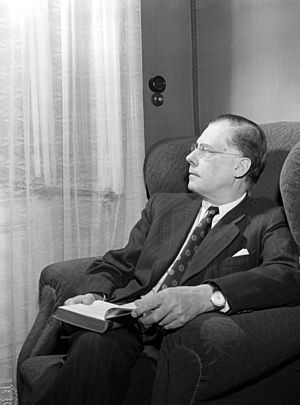Karl Böhm facts for kids
Karl August Leopold Böhm (born August 28, 1894 – died August 14, 1981) was a famous Austrian conductor. He was especially well-known for leading performances of music by Mozart, Wagner, and Richard Strauss.
Contents
Life and Career
Early Life and Training
Karl Böhm was born in Graz, Austria. His father was a lawyer. Karl first studied law and even earned a doctorate in it. But his real passion was music! He then went to the music conservatory in Graz. Later, he studied at the Vienna Conservatory. There, he learned from Eusebius Mandyczewski, who was a friend of the famous composer Johannes Brahms.
Starting as a Conductor
In 1917, Böhm began his music career in his hometown. He started as a rehearsal assistant. He made his first appearance as a conductor that same year. By 1920, he was a senior director. A famous conductor named Bruno Walter hired him for the Bavarian State Opera in Munich in 1921. One of his first big jobs there was conducting Mozart's Die Entführung aus dem Serail. Later, he became the chief music director in Darmstadt in 1927. In 1931, he moved to the Hamburg State Opera for the same role.
Leading in Vienna and Dresden
In 1933, Böhm conducted in Vienna for the first time. He led Wagner's Tristan und Isolde. The next year, he took over as head of Dresden's Semper Opera. He stayed there until 1942. This was a very important time for him. He conducted the first performances of new works by Richard Strauss, like Die schweigsame Frau (1935) and Daphne (1938). Strauss even dedicated Daphne to him!
Böhm also started conducting at the Salzburg Festival in 1938. He became a regular guest conductor there. In 1943, he got a top job at the Vienna State Opera. He eventually became its music director.
After World War II
After World War II, Karl Böhm faced a two-year ban. This was because of his actions during the war (more on that below). After the ban, he quickly returned to conducting. He led Don Giovanni in Milan in 1948. From 1950 to 1953, he directed German opera seasons in Buenos Aires, Argentina. He even conducted the first performance of Wozzeck in Spanish!
Success in New York
In 1957, Böhm made his first appearance at the Metropolitan Opera in New York. He conducted Don Giovanni. He quickly became a favorite conductor there. He led 262 performances, including the first Met performances of Wozzeck and Ariadne auf Naxos. He also conducted many other major operas. These included Fidelio, Tristan und Isolde, Der Rosenkavalier, and Elektra.
Bayreuth and Wagner's Music
Böhm first conducted at the Bayreuth Festival in 1962. This festival is famous for performing only Wagner's operas. Böhm conducted Tristan and Isolde there for many years. He also led Wagner's famous Der Ring des Nibelungen opera cycle. Some people loved his Wagner performances, finding them clear and positive. Others thought they sometimes lacked deep drama.
Later Years and Legacy
Late in his life, Böhm began working often with the London Symphony Orchestra (LSO). He made several recordings with them. He was even given the special title of LSO President. He also conducted at the Royal Opera House, Covent Garden in London in the 1970s.
Karl Böhm passed away in Salzburg in 1981, just before his 87th birthday. He was known for his strong and clear interpretations of Mozart's operas and symphonies. He recorded all of Mozart's symphonies. He also championed and recorded modern operas like Alban Berg's Wozzeck and Lulu. Many people consider him one of the greatest conductors of the 20th century.
He received special titles, like "Ehrendirigent" (Honorary Conductor) of the Vienna Philharmonic. His son, Karlheinz Böhm, became a successful actor.
Actions During World War II
While Karl Böhm never officially joined the Nazi party, he publicly supported Adolf Hitler and his government. This support helped his career. For example, he took over as music director in Dresden in 1934. The previous director, Fritz Busch, had been removed by the Nazi authorities for political reasons.
In 2015, the Salzburg Festival placed a plaque in its Karl Böhm Hall. This plaque explains that Böhm benefited from the Nazi system. It states that his career advanced because Jewish and politically disliked colleagues were removed from their positions. This shows that even great artists can have complicated histories.
Honours and Awards
Karl Böhm received many awards during his life, including:
- 1959: Grand Decoration of Honour in Silver for Services to the Republic of Austria
- 1960: Grand Merit Cross of the Federal Republic of Germany
- 1964: Honorary Ring of Vienna
- 1970: Austrian Cross of Honour for Science and Art
- 1976: Commander of the Legion of Honour
See also
 In Spanish: Karl Böhm para niños
In Spanish: Karl Böhm para niños
 | James B. Knighten |
 | Azellia White |
 | Willa Brown |


